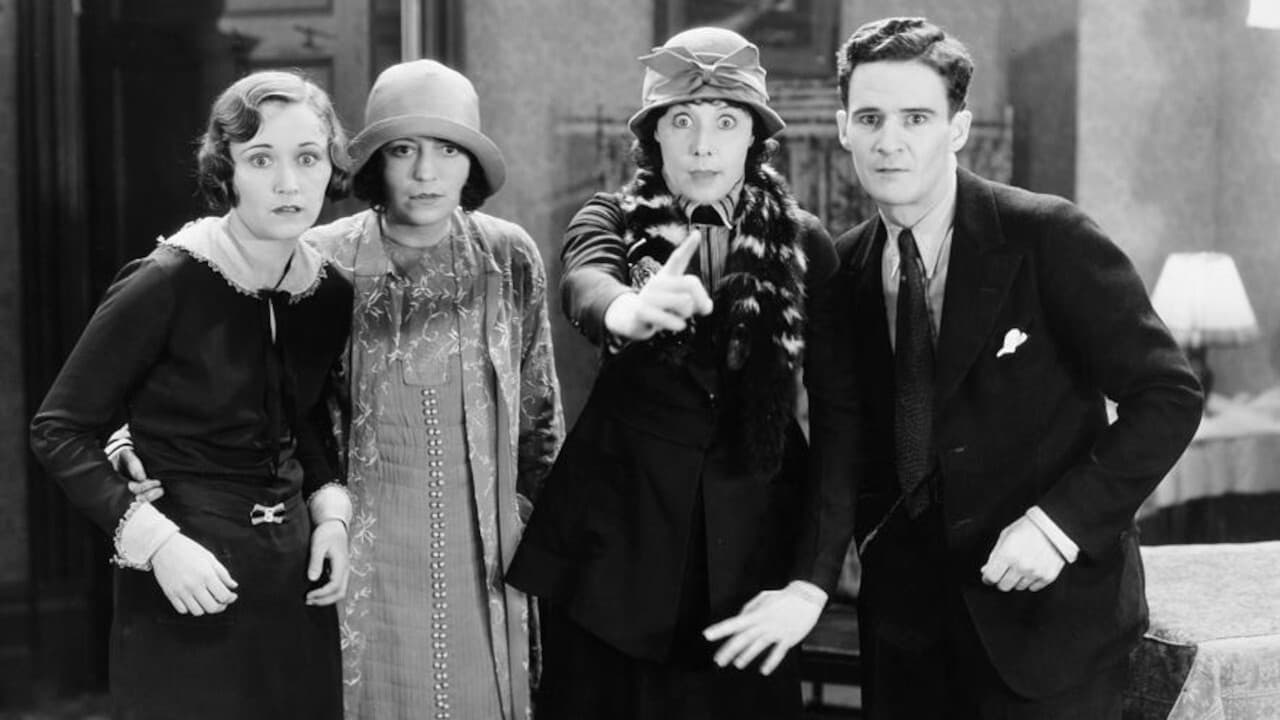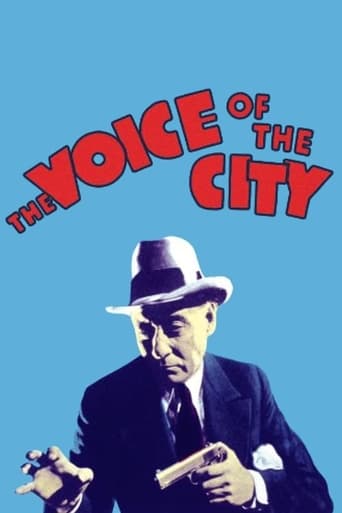



This is How Movies Should Be Made
Better Late Then Never
If you're interested in the topic at hand, you should just watch it and judge yourself because the reviews have gone very biased by people that didn't even watch it and just hate (or love) the creator. I liked it, it was well written, narrated, and directed and it was about a topic that interests me.
View MoreStrong acting helps the film overcome an uncertain premise and create characters that hold our attention absolutely.
View MoreRobert Ames was a promising screen actor whose life and career were cut short due to alcohol. Before then he had been a dependable stage actor who had played opposite Ruth Chatterton in "Come Out of the Kitchen". This movie was made at the peak of his career with the flip and witty "Holiday" still to come.His female co-stars were not exactly dazzling. Sylvia Field made a couple of films around the dawn of sound, disappeared, then came back in the early forties for character parts. Duane Thompson had been a 1925 Wampas Baby star but had found her acting vocation in westerns with stars such as Buzz Barton and Ted Wells - "Voice of the City" proved her last but one film.The actors to watch are Robert Ames, Willard Mack and John Miljan, perfecting his oily persona which stood him in good stead for many years to come. Ames plays Bobby Doyle who, as the film starts, is going over the wall in a prison break. So far, so good, but it soon after descends into a talk fest as Doyle, with "Johnny the Hop"'s help, quickly makes his way to Beebe's flat. I know talkies were new and different, acting had to be learned but Sylvia Field came from the "wide eyed" school of acting and her part was big - she was almost the equal star. She was in many of the conversational scenes and her gooey acting got a bit much at times - especially when both she and Mary are convinced of the loyalty of Don Wilkes (it's Miljan, of course), a mobster who is frantically working behind the scenes to put the police on Doyle's trail - if he can only wheedle the information out of Beebe. She has given her solemn vow not to disclose Bobby's whereabouts but within minutes under Don's smooth lies she is singing like a canary!!!Detective Biff was played by Willard Mack who also directed the movie. He had been an actor and a writer (he wrote "Tiger Rose", Lenore Ulric's greatest stage triumph) and had also been married to two beautiful actresses, Marjorie Rambeau and Pauline Frederick but he was also an alcoholic and an addict and died in the early 1930s. His Biff really channelled the type of policeman that Thomas E. Jackson was soon to make his own - raspy voiced, slow of speech, a Mr. Cool of 1929!! He also flings around a few phrases - "snowbird", "shoot that in your arm, hop, either arm"!! so the viewers know exactly the type of "problem" that Johnny has!! Also Johnny's furtive looks and skulking out of camera range with a spoon but Beebe seems none the wiser!! Johnny was the initiator of the jail break but because of his habit, police soon have him in custody, hoping with his supply cut off he will squeal - and he does!!Again there is not much action and it is clear that MGM were not comfortable with this type of gritty crime story. Robert Ames was good but once he went to the hideout there were often long stretches were Field had to hold the film up and she just wasn't able to. The most thrilling scene, when the police burst into his hide-out only to find him hanging by a rafter - but of course he is only foxing!! MGM wouldn't dare kill off the movie's hero 5 minutes before the end. Clark Marshall who was pretty good playing Johnny, was another actor who fell through the cracks - he made a couple of movies in 1919, 1920, then made a few more from 1929 on, playing parts like Lefty and Runchy!!
View MoreI'm a great fan of transition films. Those from 1928-29 tend to be static as one would assume. And the acting could be quite stilted. In this film the women are not natural at all. Robert Ames and Willard Mack are quite good but that only shines a spotlight on the inadequacies of the ladies. The lack of action and camera movement make the story rather dull. No matter. It's worth seeing once for some inventive uses of sound and the actors who never made it in the new medium.One scene popped out at me. When the lovers are kissing, the kiss lasts 16 seconds but this is accomplished by looping the film 4 times. Why would the director feel this was necessary?
View More... since he wrote, directed, and starred in this very primitive early sound crime drama. No Citizen Kane of course, but considering the limitations Mack had to work with - who exactly would make a good performer in sound films? nobody knew, the camera could not move, and the overreaching of diction coaches, this one had me entertained and not just because of its novelty.Bobby Doyle (Robert Ames) has been wrongly convicted and sentenced to twenty years for killing a cop, odd in and of itself in 1929 since most people got the chair for that crime in those days. Good friend, Johnny the Hop (Clark Marshall), sends Bobby the ropes and knives he needs to escape from prison. So much for prison security. He escapes and beats it back to his old neighborhood where he plans to hook up with his girl and then leave town and try to clear his name too if he can. First, though, Bobby has to evade the cops led by Biff Myers (Willard Mack) who are determined to put him back behind bars. I'll let you watch and find out how it all turns out.Willard Mack had a pretty good reputation as a writer before and after this film, and he does a good job here too of penning a story that, although very easy to figure out, has some pretty good twists and turns. However, like most early sound directors and writers, he just can't overcome those over-aggressive diction coaches. They've got Bobby's girl Beebe (Sylvia Field) and Bobby's sister Mary (Duane Thompson) speaking like they're British nobility all the while slinging the inner city gun moll lingo with a heavy side order of ain'ts. It really is quite ridiculous. As a result of these strange performances, Ms. Thompson's career is pretty much over after 1929 and Sylvia Field has to wait until television comes along to restart her career. You might remember her as Mrs. Wilson on "Dennis The Menace".However, the rest of the cast is quite good. Honorable mention has to go to Alice Moe as Martha. She puts out the dense aura and sage one-liners that become the stock and trade of Zasu Pitts in the 30's and beyond. All of the male players ring true including Clark Marshall as Johnny, the cocaine addicted mastermind of Bobby's escape, and best of all John Miljan as the slimy gangleader whose tongue hangs down to his knees whenever he's around Beebe - if she wasn't so busy over emoting as the virginal true blue girlfriend to Bobby you'd think she'd have to notice this! As for atmosphere, Mack really understood the power of sound. There is a great police interrogation scene - maybe the first one ever filmed with sound - in which the cops turn out the lights and with just the power of dialogue and shadows on the wall come up with something that will take Warner Brothers another two years to get right.I'd highly recommend this one. For those of you not used to early sound film it has a couple of very talky static stretches in it in which nothing much meaningful is really said or done, but overall it's a worthwhile experience.
View MoreWell, there are certain "transition" films - those made in 1928 and released either that year or the next when 'silent' became 'sound' - that just don't quite make the grade today, no matter how hard one may try to appreciate them. I watched "Voice of the City" (1929), one of four "transition" films released last week by Warner Archive Collection, a film made in the latter part of 1928 and released in early 1929. Directed by and starring Willard Mack, the main star is Robert Ames, an actor almost totally forgotten today because he died of acute alcoholism only two years later in 1931. Also appearing with these two are Sylvia Field, Jim Farley, John Miljan, and others.The opening is exquisite. The camera shots and the marvelous editing are fluid, genuinely dynamic. Then the story begins with one of the most stagnant scenes I've ever witnessed on screen, made worse because the microphone is menacingly visible throughout the entire scene! And the players play to the microphone by their stagnant - unendingly stationary - placement before it - the blocking looking much like a very amateur play done in high school. What's worse, one of the female characters is so awful as to be embarrassing to watch! Indeed, the opening expositionary scene is so stagy that I felt as if I were in a small theater with only ten seats in it for the audience. Really bad. It gets better, but, honestly, not by much. After such a good two minutes of opening...This is a crime story - and a pretty good one at that. But by the end I was happy it was over. John Miljan has the best part, even better than Robert Ames, but he's not in the show enough, and he always needs great direction to give a good performance. Here he's adequate. Frankly, the best actor in the group is the director, Willard Mack. He ought to be decent: he'd been in films since 1913! He was a writer, director, actor, and producer, and even a dialogue coach on a couple of films. He could do it all, but not necessarily well enough when left all on his own...Do NOT rush out to buy this disc. It's a curiosity at best. History in the making, but history that - thank the Lord - is past, dead and gone.
View More